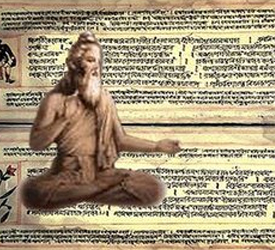Vedo Rakshati Rakshitaha

Vedic Concepts
Veda is divided into four major parts viz, Samhitas (prayers), Brahmanas (rituals), Aranyakas ( meditations) and Upanishads (The knowledge of self). The first three (Samhita, Brahmana & Aranyaka) are collectively called as Veda Purva (Starting) and the last one Upanishad is called as Veda Anta (ending) or Vedanta. The Veda Purva is also referred as Karma Kanda (Portion dealing with Rituals & Activities) and Vedanta as Jnana Kanda (Portion dealing with The Knowledge of Supreme Self).
Vedas
Vedas is a set of Holy books that is the most authoritative sacred / religious book for the Hindus.
Vedas are a very unique literature in all of religious literature in the world. Vedas are neither written by any human being, nor by God. They are universal, eternal cosmic laws. They are without beginning and end and they cannot be read like any other Holy Book of other religions. Their uniqueness is derived not merely by these features but also from the position they are accorded among the vast sacred literature in Hinduism.
But as with other Holy books, perceptions about Vedas too differ. Again, the dichotomy in perception about the Vedas is much wider when compared with other religious texts.
On the one hand, the Vedas are revered as a sacred book of wisdom, a great mass of inspired poetry, great work of numerous saints or ṛṣis, who received in their illumined minds the Vedic sounds embodied in the mantras, verses of power that are at once both the source of all divine inspiration and reveal the hidden secrets of Cosmos.
Contrary perception holds that the Vedas are nothing more than a set of superstitions and fancies of ancient barbarians concerned only with the most external gains and enjoyments and ignorant of all but the most elementary moral notions or religious aspirations. For them, even the most celebrated astronomical descriptions are nothing more than crude and rudimentary at best.
Further, even among those who hold Vedas as Book of Wisdom, there are many who view majority of the Book as pertaining to ritualistic materialism with heaven as goal (karma kānda) and actual realization of higher goals and refined morals begin only with Upanishads.
Again, 19th and 20th century thought on indology also posits a fantasy of Vedas as book of wisdom stolen by the invading Āryans from the native Dravidians.
